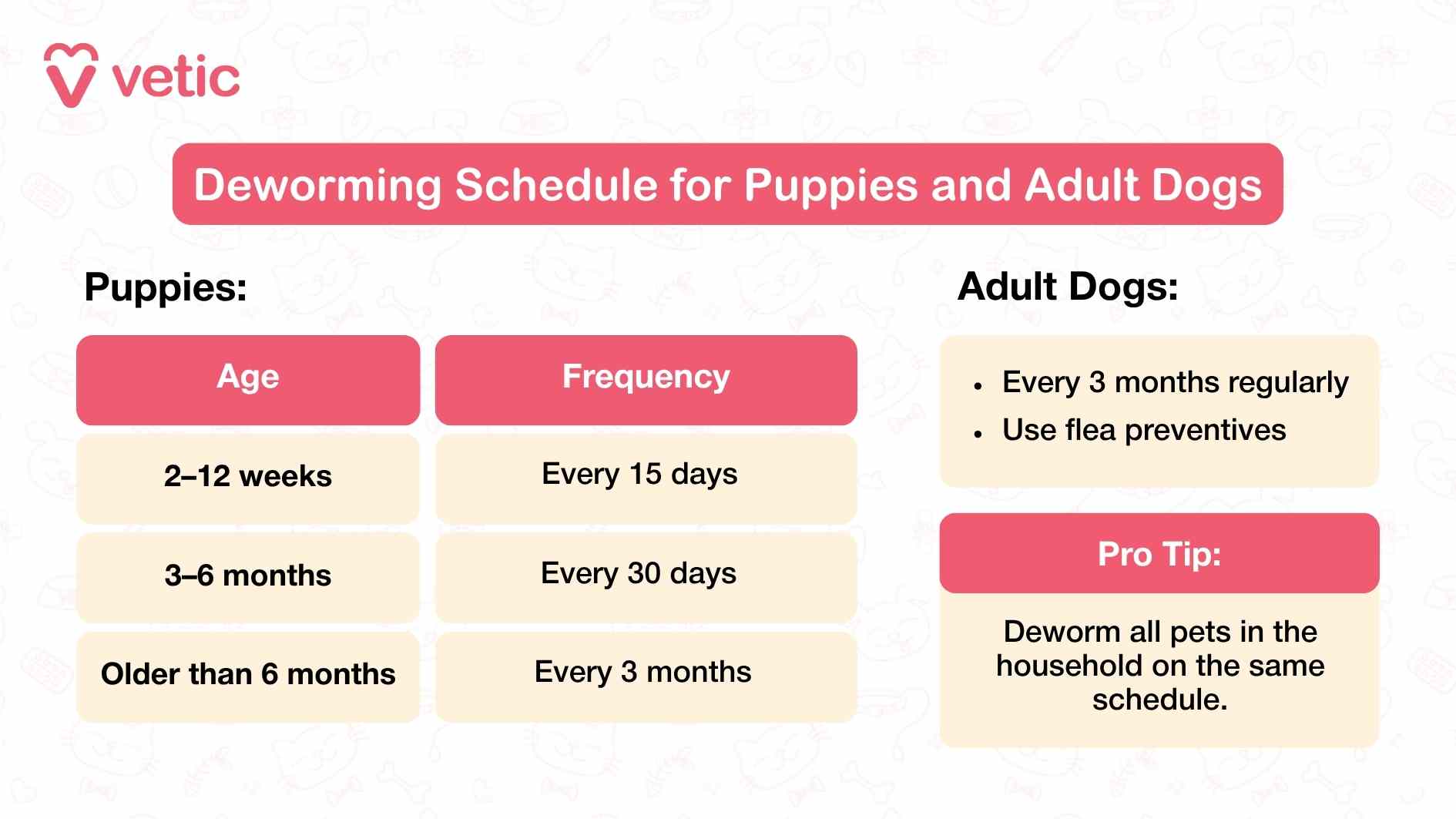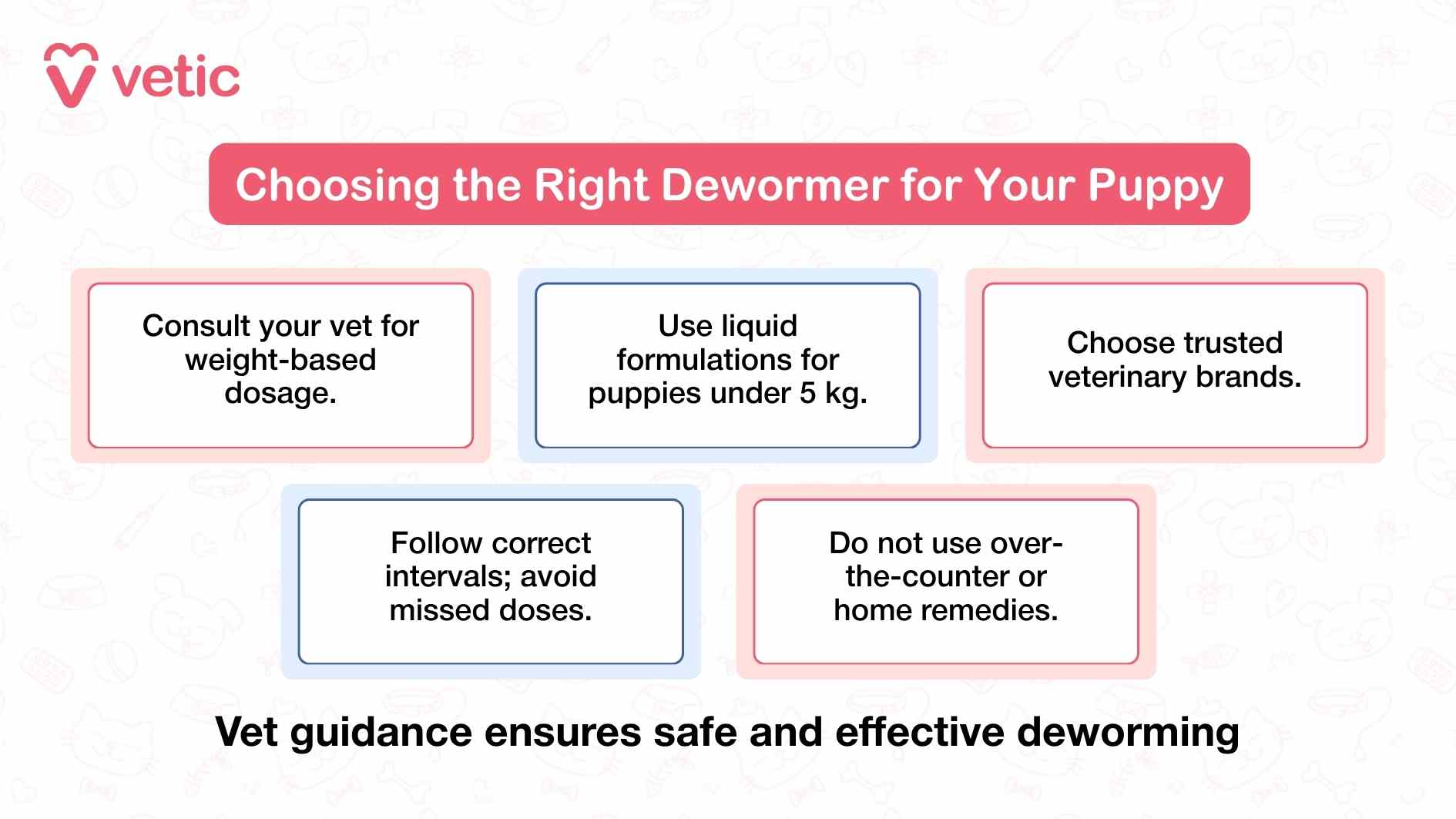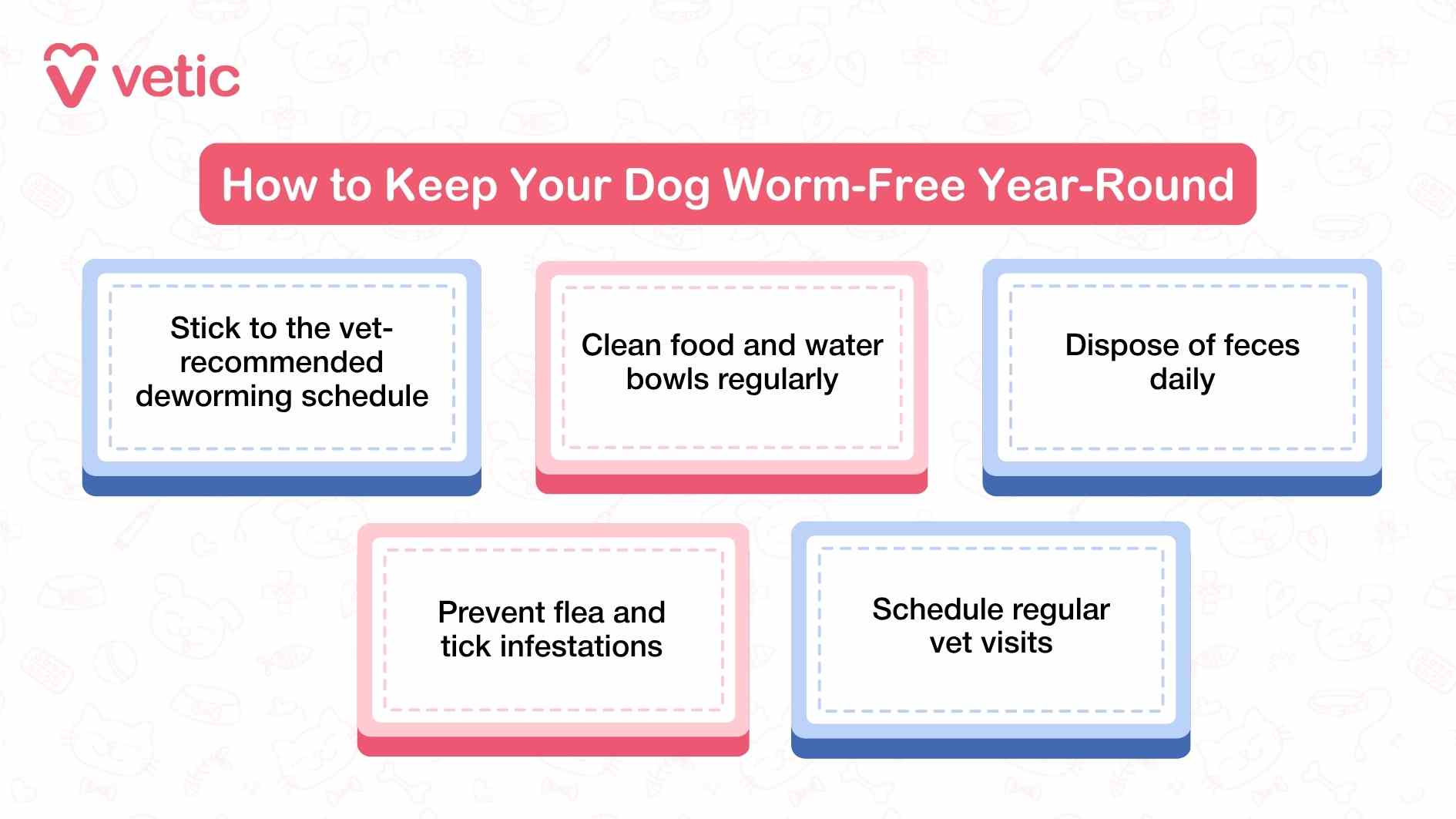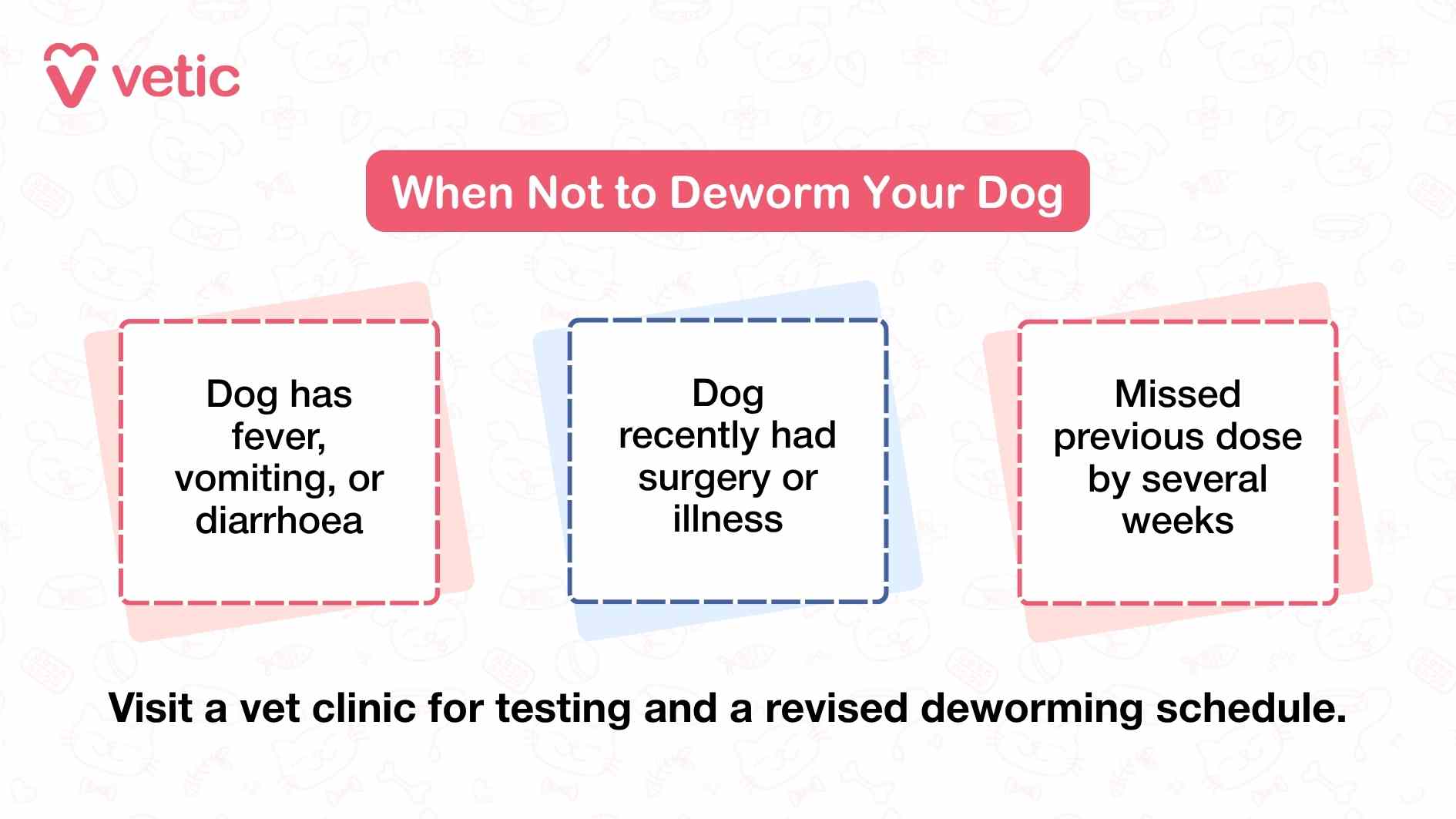Internal parasites are far more common in dogs than most pet parents realize. Puppies can get worms even before birth, while adult dogs can pick them up from soil, fleas, infected feces, or even while playing at the park. These worms live in the intestines and can cause serious health issues, from poor growth and dull coats to life-threatening anemia or organ damage. That’s why choosing the right dewormers for dogs and following a proper schedule is essential. Whether you have a tiny pup or an active adult, regular deworming protects your pet and family too.
How Frequently Should You Deworm Your Puppy?

A puppy’s first deworming is as crucial as their first vaccination. Puppies as young as 30 days old should visit a vet for their first deworming. At this stage, most puppies receive a liquid deworming medicine for dogs, carefully measured according to their body weight.
Because puppies explore their world with their mouths, they are constantly exposed to parasites. Between 1 to 3 months of age, deworming should be repeated every 15 days. From 3 to 6 months, switch to monthly doses, and after 6 months, most dogs follow a quarterly schedule.
Your veterinarian may adjust this depending on your puppy’s appetite, growth rate, or stool test results. Remember, skipping even one dose can allow worms to multiply again.
Are Puppy Dewormers the Same as Dewormers for Dogs?
A puppy dewormer is formulated to eliminate internal worms safely without harming a young pup’s delicate system. Most products come as sweet-flavoured suspensions to make dosing easier.
Common active ingredients include:
- Pyrantel embonate (pamoate): Paralyzes and expels roundworms and hookworms.
- Febantel: Converts to fenbendazole in the body and kills tapeworms and whipworms.
Because puppies have developing organs, always choose a vet-recommended deworming tablet for puppy or liquid, never a random over-the-counter option.
How to Choose the Right Dewormer for Your Puppy

Not all dog dewormers are created equal. The ideal choice depends on your puppy’s age, weight, and overall health. Vets also consider factors like local parasite prevalence and your pup’s exposure risk — for example, outdoor play areas or multi-dog households.
At Vetic clinics, veterinarians rely on well-tested, trusted brands known for consistent results and minimal side effects. They guide you on:
- Correct dosage per kilogram of body weight
- Safe intervals between doses
- Combination protection, if your puppy also needs flea or tick control
Never split tablets or guess quantities — improper dosing can reduce efficacy or cause digestive upset.
Dewormers for Dogs: When Should You Switch From a Suspension to Tablets?
As puppies grow, giving large volumes of liquid becomes difficult and messy. Once your puppy crosses 5 kg, your vet may recommend shifting from liquid to a deworming tablet for dogs.
Tablets can be hidden inside treats or pouches, ensuring accurate intake with less stress. They’re easier for pet parents and help avoid under-dosing. It is a major cause of worm resistance.
For very small breeds, your vet might still prefer liquid dosing for precision. Always follow professional advice on when to make this transition.
What Is the Composition of Dewormers for Dogs?

Most broad-spectrum deworming tablets for dogs combine three proven ingredients:
- Praziquantel: Targets and kills tapeworms.
- Pyrantel embonate (pamoate): Works against hookworms and roundworms.
- Febantel: Expands coverage to whipworms.
This trio ensures one dose clears almost all intestinal parasites common in dogs in India. Some formulations even add probiotics or vitamins to support gut health during recovery.
How Frequently Should You Deworm Your Dog?
For adult dogs, a 3-month interval is generally sufficient. However, dogs that socialize often, in boarding, parks, or training facilities, may need other formulations and frequencies.
Environmental hygiene is equally important: clean up feces promptly, wash food bowls daily, and prevent your dog from drinking stagnant water. These simple steps amplify the protection offered by the best deworming tablets for dogs.
Do the Common Dewormers for Dogs Always Work?
Most deworming medicine for dogs works effectively when administered correctly, but reinfection is possible. Dogs can easily ingest worm eggs while sniffing or licking contaminated ground.

To ensure long-term success:
- Deworm all pets in the household on the same day.
- Get a stool test every 6–12 months to confirm parasite clearance.
- Rotate brands only if your vet suspects resistance — never switch unnecessarily.
Regular vet checks make sure your chosen dog dewormer continues to work as intended.
When to NOT Deworm Your Dog

Skip deworming if your dog is vomiting, has diarrhoea, or seems feverish. Giving medication at such times can worsen dehydration or cause toxicity.
Instead, take your pet to a clinic equipped with in-house diagnostics and experienced veterinarians, such as Vetic Pet Clinics. Once stabilized, your vet will redesign a safer deworming schedule. If you’ve missed doses for several weeks, don’t double the amount; let your vet restart the cycle gradually.
Deworming protects your pet from unseen internal threats and keeps your home parasite-free. With a veterinarian’s guidance and the right dewormer for dogs, you can ensure your furry companion stays healthy, energetic, and safe year-round.
Ensure your dog or puppy is dewormed safely — book a consultation with the Vetic vets today.
FAQ on Dewormers for Dogs
Why is deworming important for puppies and dogs?
It removes internal parasites that steal nutrients and damage organs, keeping your dog strong and infection-free.
At what age should puppies be dewormed first?
Begin at 30 days old, using a liquid dewormer prescribed by your vet.
How often should adult dogs be dewormed?
Every 3 months for most dogs, or more frequently if they roam outdoors often.
Is deworming dogs necessary before pregnancy?
Yes. Treating before breeding prevents the mother from passing worms to her puppies.
How does deworming affect a dog’s immunity and overall health?
It supports nutrient absorption, reduces toxin load, and helps maintain a balanced immune response.
What are the signs that my dog may have worms?
Scooting, bloated belly, dull coat, diarrhoea, weight loss, or worms visible in stool.
Can deworming dogs prevent transmission of worms to humans?
Yes. Routine deworming reduces zoonotic risk and protects your family from parasite exposure.
Are there side effects of dewormers for dogs?
Mild effects like soft stool or temporary appetite loss can occur; serious reactions are rare with vet guidance.
Do indoor dogs and pups also need regular deworming?
Absolutely. Worm eggs can enter homes on footwear, other pets, or contaminated food.
What happens if I skip my dog’s deworming schedule?
Parasites multiply rapidly, causing poor digestion, anaemia, and weakness over time. You should speak with your vet for resuming their deworming routine.
Can I give over-the-counter deworming medicine to my dog without a vet’s advice?
No. Incorrect ingredients or dosages can be harmful. Insufficient dewormers for dogs can lead to resistance — always consult your veterinarian first.
What role do diet and hygiene play in preventing worms in dogs?
Balanced nutrition and clean surroundings reduce reinfection risk and strengthen gut health.

